The second coming of The Third Man | reviews, news & interviews
The second coming of The Third Man
The second coming of The Third Man
Vienna, the zither, a twist of Lime: Carol Reed's newly restored noir masterpiece returns
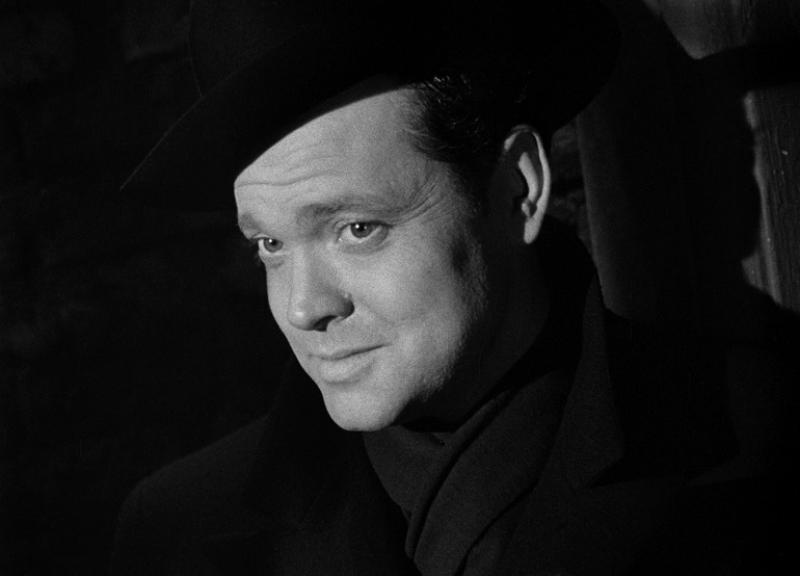
What happened to Harry Lime during the war that he slid into iniquity, or was he always a swine? What cracked in him so badly that he sold diluted penicillin that gave children meningitis? What rat-like instincts of survival prompted him to betray his Czech lover so that the Russians would evict her from Austria? And why did he summon the hapless Holly Martins from America to join his racket?
These and other questions – comprising the mystery within the mystery – are left unanswered by The Third Man, the 1949 proto-Cold War thriller, written by Graham Greene and directed by Carol Reed, which no one disputes is British cinema’s greatest film noir. It may be the greatest British movie of all if one is prepared to set aside Powell and Pressburger’s stream of masterpieces, Lean’s Dickens films, and the likes of If…, Kes, and Don’t Look Now. The new 4k restoration, which opens in cinemas this week after yesterday's UK premiere at the Edinburgh Film Festival, should lure a new generation of viewers, if they’re open to such sinister beguilement, into the dark shadows and sheeny streets of nocturnal Vienna. It may ask why an ineffable charmer who has succumbed to demonism is more irresistible to both women and men than a virtuous fool or a Monty-like officer.
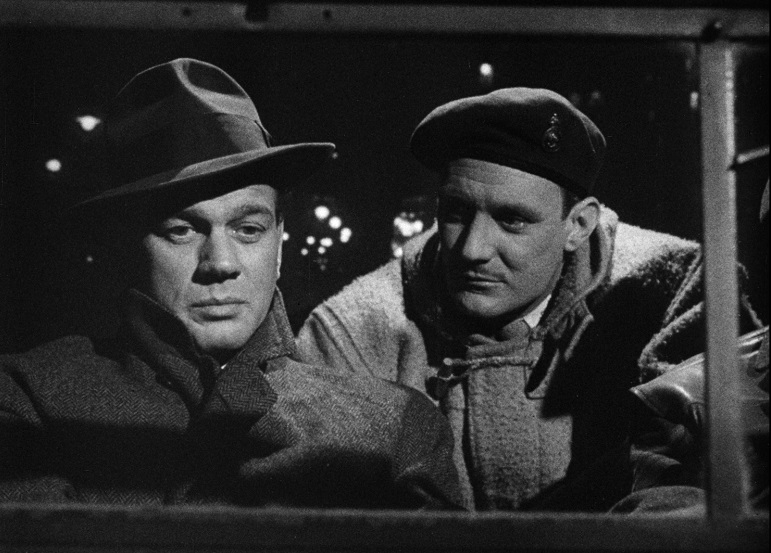 In that order, we have Orson Welles’s Harry, Joseph Cotten’s Holly, and Trevor Howard’s Major Calloway – not that Holly is so virtuous. A hard-up writer of pulp Westerns, he has arrived in Vienna because Harry has offered him a job doing he knows not what. He arrives just in time to learn his old friend has been knocked down and killed by a car, and to see him being buried in a cemetery outside the city. Among the mourners are “Baron” Kurtz (Ernst Deutsch) and Dr Winkel (Erich Ponto), Harry’s baleful-looking cohorts, and Anna Schmidt (Alida Valli), his grieving but self-contained mistress. Calloway (Trevor Howard), the military policeman who had been monitoring Lime for the British zone of the post-war quartered city, looks preoccupied but is drinking in everything; his shiny leather coat is poor camouflage (pictured above, Joseph Cotten and Trevor Howard).
In that order, we have Orson Welles’s Harry, Joseph Cotten’s Holly, and Trevor Howard’s Major Calloway – not that Holly is so virtuous. A hard-up writer of pulp Westerns, he has arrived in Vienna because Harry has offered him a job doing he knows not what. He arrives just in time to learn his old friend has been knocked down and killed by a car, and to see him being buried in a cemetery outside the city. Among the mourners are “Baron” Kurtz (Ernst Deutsch) and Dr Winkel (Erich Ponto), Harry’s baleful-looking cohorts, and Anna Schmidt (Alida Valli), his grieving but self-contained mistress. Calloway (Trevor Howard), the military policeman who had been monitoring Lime for the British zone of the post-war quartered city, looks preoccupied but is drinking in everything; his shiny leather coat is poor camouflage (pictured above, Joseph Cotten and Trevor Howard).
Afterwards, Calloway gives Holly a lift back to Vienna and buys him a drink. He tells him Harry was the dirtiest kind of racketeer. Holly assaults him and, for his trouble, is slugged, not too hard, by Calloway’s doughty sergeant (Bernard Lee), a fan of Holly’s books. Holly decides to stay to clear Harry’s name. Mistaking him for a serious American author, the British cultural re-education officer Crabbin (Wilfred Hyde-White), twinkling with fake bonhomie, says he’ll pay for Holly’s board if he’ll give a lecture on the modern novel at his institute. The next day, the oily Kurtz inadvertently alerts Holly to discrepancies in the different accounts of Harry’s fatal accident (pictured below, Alida Valli).
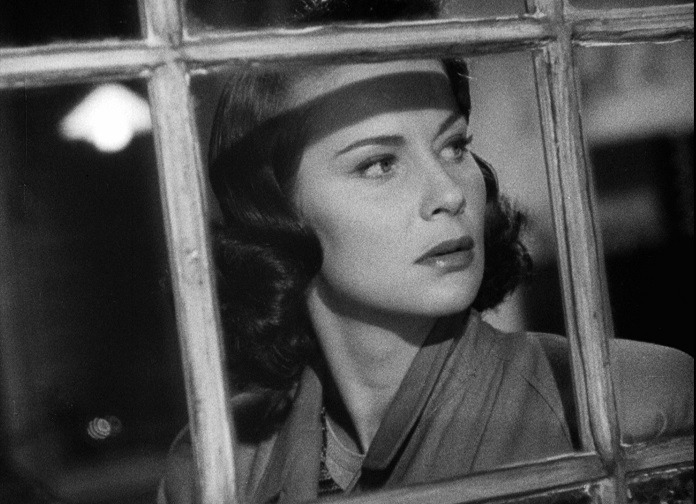 Having stumbled into Vienna in the first place, he now stumbles into detective work. He interviews and befriends Anna, the supercilious Winkel, and a worldly Romanian scoundrel, Popescu (Siegried Breur), who tries to throw him off the scent. You sense that Kurtz, Winkel, and Popescu (so brilliantly portrayed in fragments), and perhaps the missing hospital worker of the film’s title, conspired with Harry not to survive the aftermath of the war, but from a deluded sense of Old World entitlement, so as not to relinquish their comforts and luxuries – Kurtz’s little dog, Winkel’s antiques, Popescu’s lounge lizard lifestyle.
Having stumbled into Vienna in the first place, he now stumbles into detective work. He interviews and befriends Anna, the supercilious Winkel, and a worldly Romanian scoundrel, Popescu (Siegried Breur), who tries to throw him off the scent. You sense that Kurtz, Winkel, and Popescu (so brilliantly portrayed in fragments), and perhaps the missing hospital worker of the film’s title, conspired with Harry not to survive the aftermath of the war, but from a deluded sense of Old World entitlement, so as not to relinquish their comforts and luxuries – Kurtz’s little dog, Winkel’s antiques, Popescu’s lounge lizard lifestyle.
A “witness” dies, Harry’s coffin is disinterred. He’s not in it. Anna’s cat sidles up to Harry’s brogues as he stands in a doorway on the street opposite her apartment at night, a light falls on his face – though wholly predictable, Welles’s iconic entrance, late into the picture, is even more shocking than Gene Tierney’s return in Otto Preminger’s Laura (1944). Harry and Holly’s subsequent charged conversation atop and below the Prater ferris wheel on Leopoldstadt ends with Harry’s bland Kierkegaardian explanation of why more was accomplished culturally by Italy under the Borgias than by the supposedly peaceful Swiss in half a millennium (see clip below). Welles wrote the speech and Reed and Greene must have liked it, but as a specious justification of evil, it does suggest Harry let his principles slip during the Nazi era. The film climaxes with Harry’s flight in the cavernous Vienna sewers (pictured below).
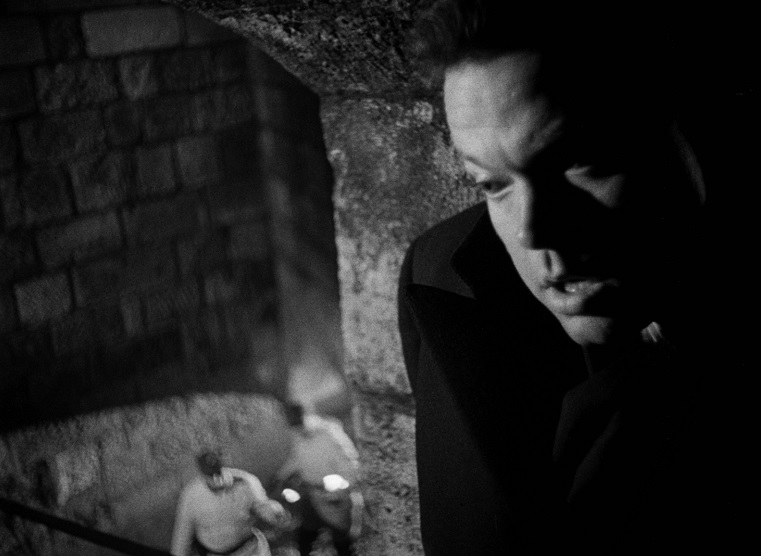 Robert Krasker, The Third Man’s Australian cinematographer, had turned the Belfast of Odd Man Out (1947), Reed’s previous film, into a phantasmagoria, the skewed vision of James Mason’s hunted, wounded IRA robber. He took a less Expressionist approach to Vienna, but he frequently tilted, or canted, the camera as a simple way of showing that this was a world off-balance (pictured below) in which the truths Holly seeks prove elusive. Reed’s masterstroke, though, was his use, at the expense of all other music on the soundtrack, of Anton Karas’s zither. It’s sometimes plaintive, but when zesty or spiky it places a barrier, in lieu of the irony impacted in Greene’s prose, between an optimistic viewer’s desire to sentimentalise Holly and Harry and their moral failings.
Robert Krasker, The Third Man’s Australian cinematographer, had turned the Belfast of Odd Man Out (1947), Reed’s previous film, into a phantasmagoria, the skewed vision of James Mason’s hunted, wounded IRA robber. He took a less Expressionist approach to Vienna, but he frequently tilted, or canted, the camera as a simple way of showing that this was a world off-balance (pictured below) in which the truths Holly seeks prove elusive. Reed’s masterstroke, though, was his use, at the expense of all other music on the soundtrack, of Anton Karas’s zither. It’s sometimes plaintive, but when zesty or spiky it places a barrier, in lieu of the irony impacted in Greene’s prose, between an optimistic viewer’s desire to sentimentalise Holly and Harry and their moral failings.
At the cemetery, Holly was immediately entranced by the Garbo-like Anna; she becomes aware of his presence slightly behind her, to her left, like one becomes aware of a fly one can’t be bothered to flick off. He is setting himself a trap. He soon learns of her unshakeable love for his more powerful friend but remains emotionally blind to it; not even Harry’s two deaths in the film, the second of which fulfils Holly’s destiny as the Oedipal son, can make her love the would-be usurper. In fact, Holly unconsciously does everything in his power to make her hate him.
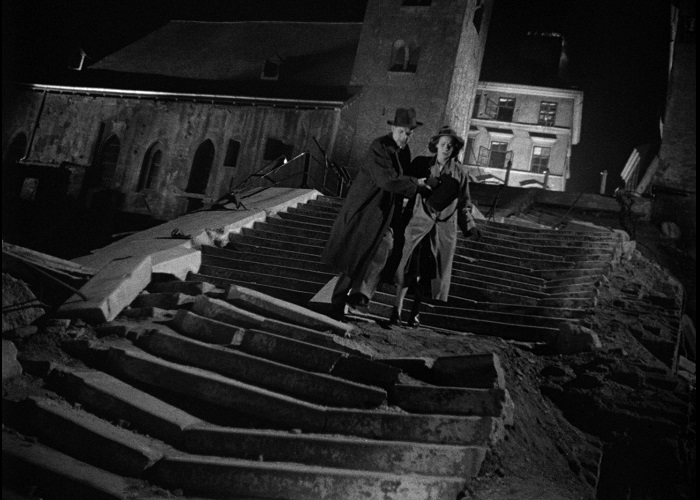 As for her refusal to cooperate with Calloway or leave Vienna as Holly wants her to, it is not an ethical choice but a selfish adherence to the memory of her and Harry’s passion. The Third Man scholar Rob White has noted that in Greene’s novella she says, “Why, when I have a sex dream, he’s always the man.” That couldn’t be said by her or anyone else in a 1949 British film, but watch how at home Anna is in Harry’s apartment or wearing his monogrammed dressing gown. A woman never lets that one lover go. Greene hints that Holly and Anna may have a future in the book and wanted the film to follow suit, but he was glad to be proved wrong by the ending Reed chose – one that, once seen, is never forgotten.
As for her refusal to cooperate with Calloway or leave Vienna as Holly wants her to, it is not an ethical choice but a selfish adherence to the memory of her and Harry’s passion. The Third Man scholar Rob White has noted that in Greene’s novella she says, “Why, when I have a sex dream, he’s always the man.” That couldn’t be said by her or anyone else in a 1949 British film, but watch how at home Anna is in Harry’s apartment or wearing his monogrammed dressing gown. A woman never lets that one lover go. Greene hints that Holly and Anna may have a future in the book and wanted the film to follow suit, but he was glad to be proved wrong by the ending Reed chose – one that, once seen, is never forgotten.
- The Third Man opens on Friday 26 June at five cinemas in London and venues in Cambridge, Nottingham, Manchester, Bristol, Newcastle, and Sheffield.
Overleaf, browse a gallery of restored images from The Third Man
Click on the thumbnail images to enlarge
rating
Explore topics
Share this article
Add comment
The future of Arts Journalism
You can stop theartsdesk.com closing!
We urgently need financing to survive. Our fundraising drive has thus far raised £49,000 but we need to reach £100,000 or we will be forced to close. Please contribute here: https://gofund.me/c3f6033d
And if you can forward this information to anyone who might assist, we’d be grateful.

Subscribe to theartsdesk.com
Thank you for continuing to read our work on theartsdesk.com. For unlimited access to every article in its entirety, including our archive of more than 15,000 pieces, we're asking for £5 per month or £40 per year. We feel it's a very good deal, and hope you do too.
To take a subscription now simply click here.
And if you're looking for that extra gift for a friend or family member, why not treat them to a theartsdesk.com gift subscription?
more Film
 Blu-ray: Le Quai des Brumes
Love twinkles in the gloom of Marcel Carné’s fogbound French poetic realist classic
Blu-ray: Le Quai des Brumes
Love twinkles in the gloom of Marcel Carné’s fogbound French poetic realist classic
 Frankenstein review - the Prometheus of the charnel house
Guillermo del Toro is fitfully inspired, but often lost in long-held ambitions
Frankenstein review - the Prometheus of the charnel house
Guillermo del Toro is fitfully inspired, but often lost in long-held ambitions
 London Film Festival 2025 - a Korean masterclass in black comedy and a Camus classic effectively realised
New films from Park Chan-wook, Gianfranco Rosi, François Ozon, Ildikó Enyedi and more
London Film Festival 2025 - a Korean masterclass in black comedy and a Camus classic effectively realised
New films from Park Chan-wook, Gianfranco Rosi, François Ozon, Ildikó Enyedi and more
 After the Hunt review - muddled #MeToo provocation
Julia Roberts excels despite misfiring drama
After the Hunt review - muddled #MeToo provocation
Julia Roberts excels despite misfiring drama
 Ballad of a Small Player review - Colin Farrell's all in as a gambler down on his luck
Conclave director Edward Berger swaps the Vatican for Asia's sin city
Ballad of a Small Player review - Colin Farrell's all in as a gambler down on his luck
Conclave director Edward Berger swaps the Vatican for Asia's sin city
 London Film Festival 2025 - Bradley Cooper channels John Bishop, the Boss goes to Nebraska, and a French pandemic
... not to mention Kristen Stewart's directing debut and a punchy prison drama
London Film Festival 2025 - Bradley Cooper channels John Bishop, the Boss goes to Nebraska, and a French pandemic
... not to mention Kristen Stewart's directing debut and a punchy prison drama
 London Film Festival 2025 - from paranoia in Brazil and Iran, to light relief in New York and Tuscany
'Jay Kelly' disappoints, 'It Was Just an Accident' doesn't
London Film Festival 2025 - from paranoia in Brazil and Iran, to light relief in New York and Tuscany
'Jay Kelly' disappoints, 'It Was Just an Accident' doesn't
 Iron Ladies review - working-class heroines of the Miners' Strike
Documentary salutes the staunch women who fought Thatcher's pit closures
Iron Ladies review - working-class heroines of the Miners' Strike
Documentary salutes the staunch women who fought Thatcher's pit closures
 Blu-ray: The Man in the White Suit
Ealing Studios' prescient black comedy, as sharp as ever
Blu-ray: The Man in the White Suit
Ealing Studios' prescient black comedy, as sharp as ever
 The Woman in Cabin 10 review - Scandi noir meets Agatha Christie on a superyacht
Reason goes overboard on a seagoing mystery thriller
The Woman in Cabin 10 review - Scandi noir meets Agatha Christie on a superyacht
Reason goes overboard on a seagoing mystery thriller
 London Film Festival 2025 - crime, punishment, pop stars and shrinks
Daniel Craig investigates, Jodie Foster speaks French and Colin Farrell has a gambling habit
London Film Festival 2025 - crime, punishment, pop stars and shrinks
Daniel Craig investigates, Jodie Foster speaks French and Colin Farrell has a gambling habit
 I Swear review - taking stock of Tourette's
A sharp and moving tale of cuss-words and tics
I Swear review - taking stock of Tourette's
A sharp and moving tale of cuss-words and tics

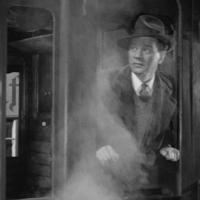
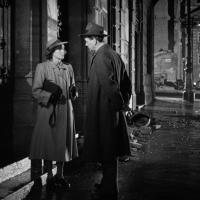
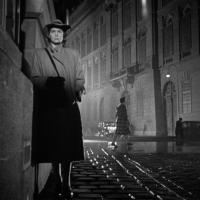
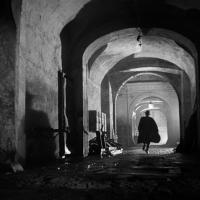
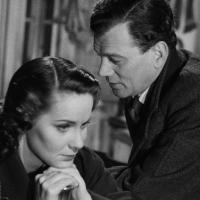
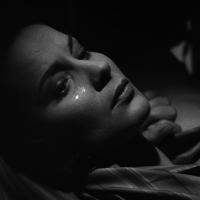

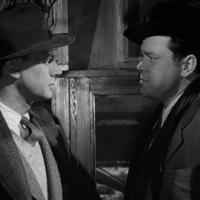
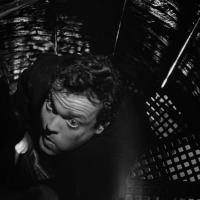
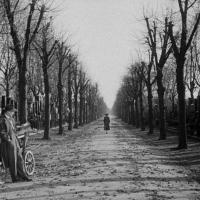
Comments
Two things: Graham Greene's
"The Third Man" has been one
After 40 years this remains
"Harry never grew up, he was